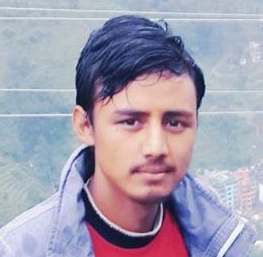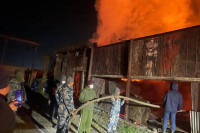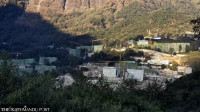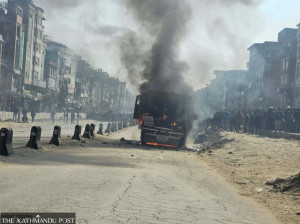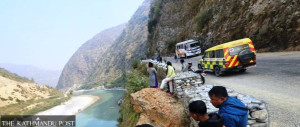Bagmati Province
Lack of secondary level school forcing students in this remote Sindhupalchok village to abandon studies
Students have to take a three-day walk to reach the nearest secondary level school in Gumbathan.
Anish Tiwari
The poor state of Tembathan Basic School in Sindhupalchok is evident in its classrooms—damp decaying wooden floorboards, torn out posters and chart papers strewn across the floor. But Pemba Sherpa, a class topper, has other things to worry about her school than just its physical structure.
Pemba is in grade five with little hope of ever attending grade six since her school runs classes only up to grade five. The nearest secondary level school, Seti Devi Secondary School in Gumbathan, is a three-day walk from her village and attending daily classes there is out of the question for Pemba.
“This is my second consecutive year in grade five and I don’t know if I will ever be able to attend grade six,” said 13-year-old Pemba.
According to Pemba, other students who have completed their basic school education have abandoned studies and opted to graze cattle in the highlands because of the arduous journey they have to take to reach Gumbathan. “I fear I’ll also, in the end, have to graze cattle,” said Sherpa, who aims to become a doctor when she grows up.
Around 82 students from Dipu and Tega among other villages come to Tembathan Basic School to take classes. They cross the Brahmayani River and Lekali jungle to reach Tembathan, a remote village in the district which is yet to be linked with accessible roads. The basic school runs classes in a worn-out building. During the monsoon season, the school is closed owing to treacherous paths and leaky roofs and walls of the school building. Some of the students from well-off families, as per the village standards, send their children to the Capital for schooling while those who cannot afford to, remain in the village without any options for further studies.
“I want to study so that I can open a school in my village and teach. But here it seems impossible to get education beyond grade five and my parents do not have the required resources to send me to Kathmandu for further education,” said Sunam Sherpa, another student at the basic school, “How will I become successful in life when I cannot pursue my higher studies?”
Phurba Sherpa, a teacher at the Tembathan Basic School, informed that there are currently 15 students enrolled in grade five. “These students face a big dilemma after completing their basic-level education. Those who can afford it take their children to Kathmandu, those who can’t remain in the village,” said Phurba. “The situation of education here is pitiful as the children’s study comes to a halt after the basic level.”
The villagers have time and again urged the local and provincial authorities to construct a proper school building for basic and secondary schools in Tembathan. A school constructed by the authorities for Rs 10 million lacks quality and it only caters to the children in basic level.
Saila Sherpa, a local leader at Tembathan, said that since the local authorities have turned a deaf ear towards their demands, the situation has come where the locals will have to head to the Capital to protest in order to fulfil their needs.
“No one in our village has received higher education. The situation of education in districts like Humla and Jumla has also started to gain momentum. But our village has seen no improvements when it comes to education,” said Saila. “We lived our life without education in darkness and now our coming generations are also being forced to live their lives in the dark.”
Krishna Subedi, chief of the District Education Development and Coordination Division, said that the local governments should take the initiative to formulate laws that would facilitate in delivering higher education to children.
“The issue can be resolved if the concerned rural municipality takes necessary initiatives as there is no obstruction from the government when it comes to providing higher education,” said Subdei.
However, Jugal Rural Municipality Chairman Hom Narayan Shrestha, while accepting the fact that the region lacks a secondary school, informed that they have been providing the needed infrastructure to the school and are working on establishing an institution for higher education.
“The main problem for us is that government-allotted teachers do not serve their full-term,” said Shrestha, “We have been receiving complaints from the locals regarding the situation of education time and again, and we are working to resolve the issue.”




 22.26°C Kathmandu
22.26°C Kathmandu